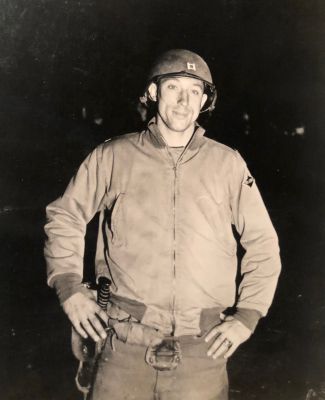Harvey Cook: A Spartan Who Served

Harvey Cook: A Spartan Who Served
October 20, 2022Over the decades, thousands of Spartans have filled the ranks of the U.S. Armed Forces, nobly serving the nation in powerful and essential ways.
Colonel Harvey Cook is one of them. A 32-year veteran of the U.S. Army, Cook fought in three different wars, held various leadership positions in intelligence and security operations and played an integral role in D-Day, the ambitious Allied military assault credited with spurring the end of World War II.
A native of Narberth, Pennsylvania, Cook ventured to then Michigan State College (MSC) in 1936, starring on the baseball diamond under legendary coach John Kobs. He earned his degree in Business Administration in 1940. Cook worked for one year as a certified public accountant before accepting his active-duty assignment with the U.S. Army in October 1941, two months before the Japanese attacked Pearl Harbor.
“My mother thought he was called up, but he really volunteered,” Don Cook said of his father.
In late 1943, Lieutenant Colonel James Rudder, commander of the 2nd Ranger Battalion, assembled his troops at Maryland’s Camp Ritchie for training in advance of their overseas deployment. Over four days, Rudder’s group learned about enemy tactics and weapons, including a spirited lesson from Cook on hand-to-hand combat and knives – so spirited, in fact, Rudder invited Cook to join the 2nd Rangers.
Throughout World War II, Cook emerged a prominent force in the 2nd Ranger Battalion, the inspirational unit behind the award-winning film “Saving Private Ryan.” His knowledge of German military operations informed the Rangers’ training and planning for the D-Day invasion in Normandy, France.
After breaking out of Normandy, Cook helped lead the Rangers’ successful mission to halt German forces in Brittany. The nearly three-week battle ended when Cook arranged the surrender of 1,400 German soldiers to 300 Rangers.
Cook, who earned the Silver Star for his D-Day actions, said of the Rangers with whom he served: “I am convinced there will never be another outfit like the 2nd Ranger Battalion. We had no cowards. Scared? Yes! But not cowards and we never had a mission we didn’t perform.”
In his late teenage years, Don Cook remembers traveling to Normandy with his father, who narrated his D-Day experience by pointing out German positions on Omaha Beach and atop the Pointe du Hoc cliff.
“He was quite emotional about the experience,” Don Cook recalled. “At 26, this was a seminal event in his life. There was success, of course, but he also lived with the trauma of men dying and being wounded. Clearly a case of survivor’s guilt like so many had.”
“ We had no cowards in the 2nd Ranger Battalion. Scared? Yes! But we never had a mission we didn’t perform.”
Following World War II, Cook crisscrossed the U.S. and the world assigned to different intelligence roles, serving in Japan, France and Germany as well as the Pentagon. He later crafted plans to transition the U.S. Army of the Pacific to an all-volunteer force and concluded his career advocating for veterans wounded during service as president of the Physical Evaluation Board at Valley Forge Military Hospital.
Cook, who retired from the military in 1972 and died in 2003, was inducted into the Ranger Hall of Fame in 2021.
Don Cook followed in his father’s footsteps, graduating from Michigan State in 1969 before embarking on his own 36-year career in the U.S. Air Force. He retired as a four-star general in 2005 and earned the MSU Distinguished Alumni Award in 2003 for his decorated military career.
“I learned honesty and integrity from my father and a love for Michigan State, too,” said Don Cook, one of four children Harvey Cook had with his MSC-educated sweetheart, Bonnie. “He was a man who said what he was going to do and then did it.”
Contributing Writer(s): Daniel P. Smith




